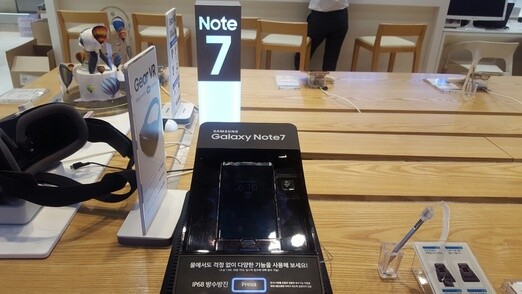hankyoreh
Links to other country sites 다른 나라 사이트 링크
An enormous task: disposing of 4.3 million Galaxy Note 7 smartphones

The aftermath of the discontinuation of the Galaxy Note 7 smartphone, which has caused so much trouble to both Samsung Electronics and its customers, is posing yet more problems. Greenpeace is demanding that specific steps be laid out for how to deal with the huge waste of natural resources that can be expected to occur in the process of disposing of 4.3 million phones.
On Nov. 1, Greenpeace issued calls for Samsung to come up with measures for recycling, pointing out that if the company simply discards the phones, a tremendous amount of precious minerals, including 20,000 kg of cobalt, will go to waste. The organization cited not only the maker of the Galaxy Note 7 but all manufacturers of electronic products as neglecting an active role in collecting and recycling products that are no longer in use.
Lee Hyun-sook, a senior IT activist at Greenpeace’s Seoul office, said, “The Galaxy Note 7 situation highlights the important question of what the environmental effects of disposing of recalled products and those still sitting in warehouses will be. Samsung can recover its customers‘ trust if it develops a feasible plan for reusing natural resources.” Samsung’s global recall of the phones is ongoing.
Greenpeace claims that the Galaxy Note 7 phones contain very large amounts of precious and rare metals. According to data provided by Oko-Institut, a German environmental research agency, 4.3 million Galaxy Note 7 phones contain an estimated 100 kg of gold, 1,000 kg of silver, 20,000 kg of cobalt, and 1,000 kg of tungsten. Greenpeace says that in addition to these materials, a great amount of energy and other resources had already gone into procuring them. For example, to obtain 20,000 kg of cobalt, more than 1,000 tons of ore must be dug up; 100,000 tons of rock has to be mined to get 100 kg of gold; and about 9,000 tons of rock are required in order to obtain 1,000 kg of silver.
To stir up public opinion on the recycling of the resources contained in discarded electronic goods (e-waste), Greenpeace is collecting signatures online for a “Save the Galaxy” campaign, urging Samsung to develop a plan for wise recycling of resources. But it does not stop with Samsung. The organization is pushing for thorough recycling by all electronics manufacturers in a world where currently less than 20 percent of cell phones are collected and recycled.
It appears that Samsung will not refurbish the recalled Galaxy Note 7s but will discard them all after recovering some of the metals from them. It seems that it would be too difficult to modify the liquid-crystal displays of the phones to suit other models. A Samsung source said, “We haven’t yet made a final decision on what we’ll do with the recalled phones, but we will make our plans public as soon as they are settled.”
Samsung Electronics has suffered a loss of more than 7 trillion Korean won (US$6.16 billion) over the Galaxy Note 7 debacle. At a ceremony commemorating the 47th anniversary of the company’s founding, CEO and Vice Chairman Kwon Oh-hyun said, “The recent crisis gives us an opportunity to make a new start as we reflect on whether we have allowed ourselves to become too complacent. Let us reexamine how we work then thoroughly and systematically improve it.”
By Lee Wan, staff reporter
Please direct questions or comments to [english@hani.co.kr]

Editorial・opinion
![[Column] Has Korea, too, crossed the Rubicon on China? [Column] Has Korea, too, crossed the Rubicon on China?](https://flexible.img.hani.co.kr/flexible/normal/500/300/imgdb/original/2024/0419/9317135153409185.jpg) [Column] Has Korea, too, crossed the Rubicon on China?
[Column] Has Korea, too, crossed the Rubicon on China?![[Correspondent’s column] In Japan’s alliance with US, echoes of its past alliances with UK [Correspondent’s column] In Japan’s alliance with US, echoes of its past alliances with UK](https://flexible.img.hani.co.kr/flexible/normal/500/300/imgdb/original/2024/0419/2317135166563519.jpg) [Correspondent’s column] In Japan’s alliance with US, echoes of its past alliances with UK
[Correspondent’s column] In Japan’s alliance with US, echoes of its past alliances with UK- [Editorial] Does Yoon think the Korean public is wrong?
- [Editorial] As it bolsters its alliance with US, Japan must be accountable for past
- [Guest essay] Amending the Constitution is Yoon’s key to leaving office in public’s good graces
- [Editorial] 10 years on, lessons of Sewol tragedy must never be forgotten
- [Column] A death blow to Korea’s prosecutor politics
- [Correspondent’s column] The US and the end of Japanese pacifism
- [Guest essay] How Korea turned its trainee doctors into monsters
- [Guest essay] As someone who helped forge Seoul-Moscow ties, their status today troubles me
Most viewed articles
- 1[Column] The clock is ticking for Korea’s first lady
- 2Hong Se-hwa, voice for tolerance whose memoir of exile touched a chord, dies at 76
- 3After 2 months of delayed, denied medical care, Koreans worry worst may be yet to come
- 4[Column] Has Korea, too, crossed the Rubicon on China?
- 5US overtakes China as Korea’s top export market, prompting trade sanction jitters
- 6Samsung barricades office as unionized workers strike for better conditions
- 7All eyes on Xiaomi after it pulls off EV that Apple couldn’t
- 8[Correspondent’s column] In Japan’s alliance with US, echoes of its past alliances with UK
- 975% of younger S. Koreans want to leave country
- 10[Correspondent’s column] The US and the end of Japanese pacifism